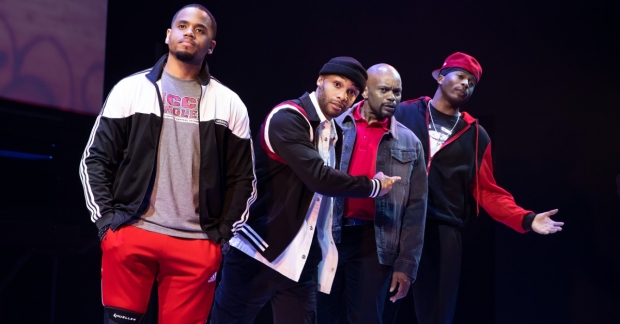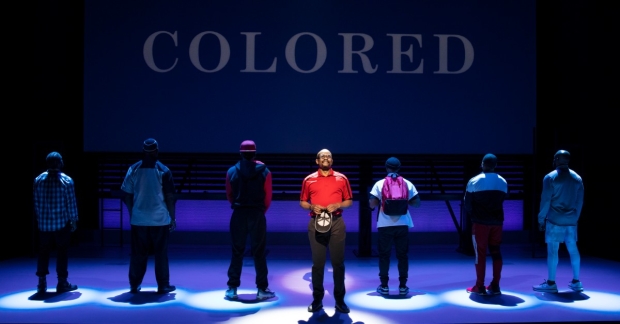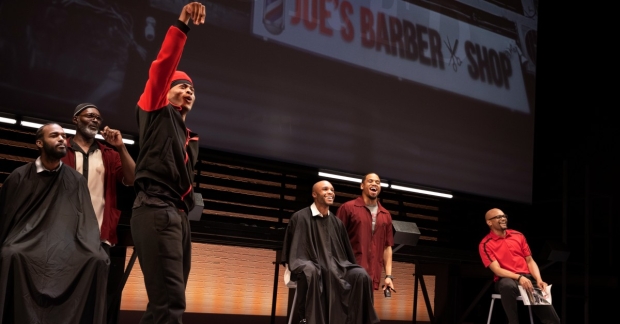Review: Thoughts of a Colored Man Makes a Triumphant Broadway Debut

(© Julieta Cervantes)
Both Slave Play and Pass Over came to Broadway after highly acclaimed off-Broadway runs. Thoughts of a Colored Man, however, has only a 2019 world premiere at Syracuse Stage and a subsequent run at Baltimore Center Stage to its credit before its leap to the Golden Theatre in New York City. That makes Keenan Scott II's new play somewhat unique among the slew of shows about the Black experience populating the Broadway landscape as it gradually reopens. Even the recently opened Chicken and Biscuits had a run at New York's Queens Theatre in early 2020 before hitting Broadway. Its recent arrival in New York, however, only makes the triumph of this remarkable show all the sweeter.
Scott takes a kaleidoscopic approach in examining a broad range of Black, specifically male, lives. There are seven characters, all of them given names that roughly correspond to their personalities: Love (Dyllón Burnside), Happiness (Bryan Terrell Clark), Wisdom (Esau Pritchett), Lust (Da'Vinchi), Passion (Luke James), Depression (Forrest McClendon), and Anger (Tristan Mack Wilds). But these seven men aren't the mere icons suggested by their names (which, small spoiler alert, aren't mentioned until the very end), but human beings who gain dimensions as the play progresses.
Though it's set primarily in the Bedford-Stuyvesant neighborhood of Brooklyn, Thoughts of a Colored Man spans generations and income brackets. The life experience of elderly barbershop owner Wisdom, for instance, contrasts with Love's youthful ardor, expressed in eloquent slam poetry, and his more ribald companion, Lust. The dead-end life of Depression — who majored in electrical engineering, but who currently works as a clerk at Whole Foods — finds its polar opposite in the upper middle-class existence of Happiness, who, though seen by some of the men in Bed-Stuy as an emblem of everything wrong with gentrification, carries anxieties of his own as a gay Black man who desires to fit in with his neighbors.

(© Julieta Cervantes)
Thoughts of a Colored Man is structured as a series of sketches, ranging from the comic to the heartbreaking as Scott juxtaposes conventionally dramatic scenes with monologues, slam poetry, and even the occasional musical number and dance sequence. Even as its freeform surface delights, Scott gets at fascinating and uncomfortable truths. A few of the characters in one sequence are waiting in line for a coveted pair of Jordans, which occasions a collective reflection on importance of the sneaker brand as a status symbol among Black men. In another scene, Anger rails against an exploitative college basketball system that posits sports stardom as the only way Black people can escape difficult circumstances. But in Scott's world, righteous fury exists alongside heart-filling joy and a wealth of humor, with a compassionate eye underpinning it all.
Steve H. Broadnax III supports Scott's all-embracing vision with relatively spare direction that allows the playwright's words to fully resound. Onto Robert Brill's billboard-like set design, Sven Ortel's projections evoke a sense of place through images of building awnings, street corners, and local bus and train stations, all while the word "Colored" remains etched in the background throughout. But there are occasional moments of expressionistic splendor. Most memorably, while Love is reciting an ode to a woman he has had an eye on throughout the show, lighting designer Ryan O'Gara gradually turns the whole theater into a sky full of stars, which composers Te'la and Kamauu imbue with an extra sparkle through their atmospheric music.

(© Julieta Cervantes)
But it's the uniformly excellent cast who dominates the production. Though Pritchett's gravelly voiced authority and Burnside's wide-eyed passion make particularly strong impressions among the seven, Forrest McClendon is arguably the most memorable. His awkward physical and vocal manner initially seems overdone until we learn more about his character's background and his sense of filial piety, after which McClendon's performance begins to attain a more poignant and ultimately tragic grandeur.
With upcoming productions of Lynn Nottage's Clyde's, Alice Childress's Trouble in Mind, and Dominique Morisseau's Skeleton Crew, among others, still to come, it remains to be seen whether Broadway's newfound emphasis on plays addressing the Black experience is the start of a lasting trend, or simply a blip before Broadway returns to business as usual. Alas, money still talks in our capitalistic society, and the only way one can ensure work as adventurous as Scott's play continues to appear on Broadway stages is if audiences show up for it. And if any show on Broadway deserves all the financial success in the world, it's this impassioned, inventive, insightful, and cumulatively moving achievement.











